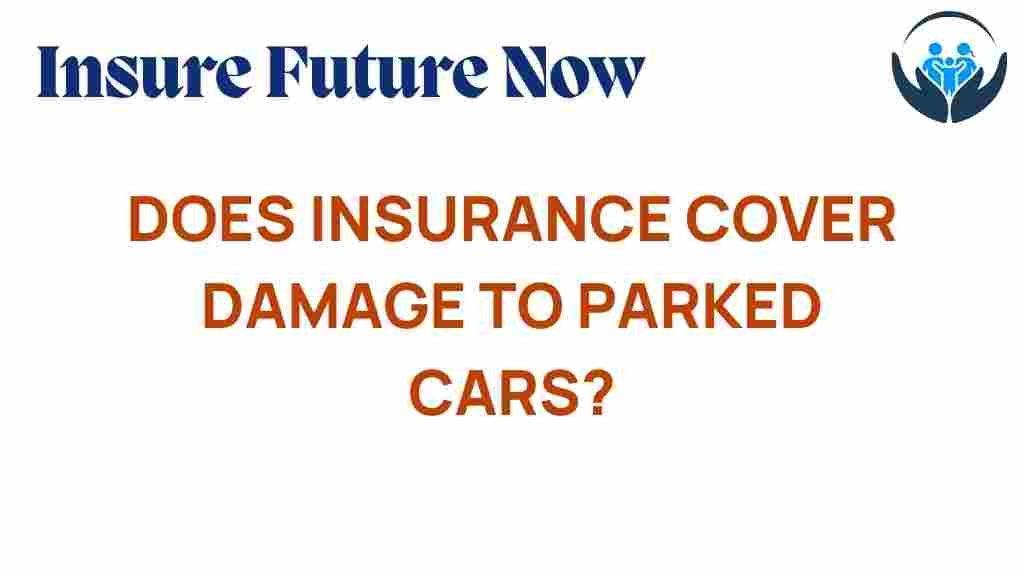Unraveling the Mystery: Does Insurance Cover Damage to Parked Cars?
When it comes to protecting our vehicles, understanding insurance coverage can often feel like navigating a complex maze. One common question that arises among car owners is whether their auto insurance will cover damage sustained by parked cars. Whether it’s an unfortunate accident, vandalism, or weather damage, knowing what your policy entails is crucial for ensuring your vehicle’s protection. In this article, we will delve into the various facets of damage claims related to parked cars, exploring the types of coverage available, and how to navigate the claims process.
Understanding the Basics of Auto Insurance
Before diving into specifics, it’s essential to understand the different types of auto insurance coverage that may apply to parked cars. The two primary types of coverage relevant to this discussion are:
- Comprehensive Coverage: This type of coverage protects against non-collision-related incidents. This includes damage from weather events, theft, vandalism, and other unforeseen circumstances.
- Collision Insurance: This coverage helps pay for damage to your car resulting from a collision, regardless of whether it’s parked or moving.
Having these coverages can significantly impact your ability to file a damage claim for a parked car. Understanding your policy details is key to determining what incidents are covered.
Does Your Insurance Cover Damage to Parked Cars?
The short answer is: it depends. Here are some scenarios in which your insurance coverage may apply:
- Accidental Damage: If another driver accidentally collides with your parked car, your collision insurance may cover the damage, subject to your deductible.
- Vandalism: If your parked car is vandalized, comprehensive coverage can help pay for the repairs.
- Weather-Related Damage: Events like hail, falling trees, or flooding may be covered under comprehensive insurance.
- Theft: If your parked car is stolen, comprehensive coverage typically provides compensation.
To better understand your coverage, it’s important to review your specific policy details and consult with your insurance provider for clarification.
The Claims Process for Parked Car Damage
If your parked car has sustained damage, following a structured claims process will help ensure you receive the compensation you’re entitled to. Here’s a step-by-step guide:
Step 1: Assess the Damage
Begin by thoroughly assessing the extent of the damage to your vehicle. Take detailed photographs of the damage from multiple angles, as this will be crucial evidence for your claim.
Step 2: Gather Necessary Information
Collect all relevant information, including:
- The date, time, and location of the incident.
- Contact information for any witnesses, if applicable.
- Details of the other party involved, if it’s an accident.
Step 3: Contact Your Insurance Company
Notify your insurance provider about the incident as soon as possible. Provide them with the gathered information and evidence. They will guide you through the process of filing a damage claim.
Step 4: File Your Claim
Your insurance company may have specific forms or online portals for submitting claims. Ensure you complete all required documentation accurately to avoid delays.
Step 5: Follow Up
After filing your claim, stay in touch with your insurance adjuster. They may need to assess the damage in person or request additional documentation. Be proactive in your communications to expedite the claims process.
Step 6: Receive Compensation
Once your claim is approved, your insurance company will provide compensation for the repairs, minus any applicable deductibles. Ensure you understand how your deductible affects your payout.
Troubleshooting Common Issues with Damage Claims
Even with a solid understanding of the claims process, you may encounter hurdles. Here are some common issues and tips for resolving them:
Claim Denial
If your claim is denied, review the specific reasons provided by your insurance company. Common reasons may include:
- Lack of coverage for the type of damage.
- Failure to report the claim within the required timeframe.
- Inadequate evidence to support your claim.
If you believe your claim was unjustly denied, you can appeal the decision by providing additional information or evidence.
Slow Processing Times
If you find your claim is taking longer than expected, reach out to your insurance adjuster for a status update. Sometimes, additional documentation or clarifications are needed, and being proactive can help speed up the process.
Understanding Deductibles
It’s crucial to understand how your deductible affects your compensation. If the cost of repairs is less than your deductible, you may need to pay for the repairs out of pocket. Review your policy to understand how deductibles apply to different types of coverage.
Conclusion: Protecting Your Parked Car
In conclusion, the question of whether insurance covers damage to parked cars is multifaceted and largely dependent on your specific auto insurance policy. By understanding the types of coverage available—such as comprehensive coverage and collision insurance—you can better navigate potential damage claims. Remember, reviewing your policy details and maintaining clear communication with your insurance provider are key steps in ensuring your vehicle’s protection.
For further information on auto insurance options, you can visit Insurance Information Institute for resources. Additionally, always keep an eye on your parked car and consider taking precautionary measures to minimize risks. If you have questions about your specific coverage, don’t hesitate to reach out to your insurer for personalized advice.
This article is in the category Claims and created by InsureFutureNow Team
